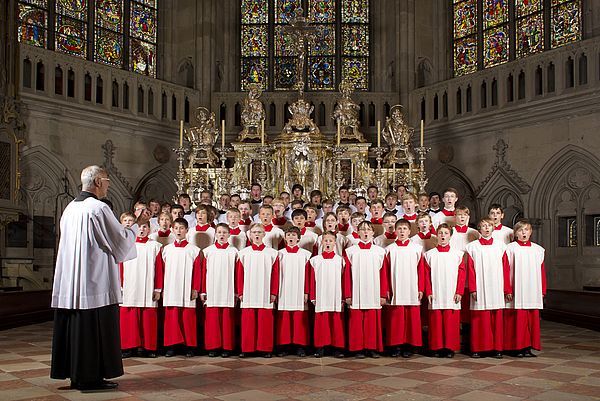Upcoming

Am 18. Januar können Sie beim Neujahrskonzert in der Pfarrkirche St. Willibald mit Mozart und Haydn, dargeboten von professionellen Musikern, in das neue Jahr starten. Das Konzert beginnt um 16 Uhr. Der Eintritt beträgt 15 € (bis 16 Jahren kostenfrei). Im Anschluss findet der Neujahrsempfang der Pfarrei im Pfarrzentrum, Auf der Wied 9 statt, zu dem Sie ebenfalls herzlich eingeladen sind.

Anniversary Concert – 40 Years of Capella Vocale Munich
Works by J. S. Bach, Steven Heelein (world premiere), and Sven-David Sandström
Capella Vocale Munich and the Baroque ensemble Concerto München, conducted by Jakob Steiner
Soloists: Laura Hemingway (mezzo-soprano), Julian Habermann (tenor), Marlo Honselmann (baritone)
Sing! For 40 years, this has been the motto of Capella Vocale Munich.
At the center of the anniversary concert is Johann Sebastian Bach’s festive New Year’s cantata “Singet dem Herrn ein neues Lied” (“Sing to the Lord a New Song”), which is interwoven with and commented on by the commissioned composition “untitled III (Atem der Statuen)” by composer Steven Heelein.
With this program, Capella Vocale not only aims to celebrate its milestone birthday with sonic splendor, but also to highlight the subtle nuances that have shaped the choir for four decades: listening attentively to one another and crafting a compelling musical architecture through meticulous rehearsal work.
Composer talk with Steven Heelein: 4:00 PM

Conductor: Christian Rohrbach

Johann Sebastian Bach: "St John Passion" BWV 245
Akademie für Alte Musik Berlin (Akamus)
RIAS Chamber Choir Berlin
Conductor: Justin Doyle
Tenor (Evangelist): Benedikt Kristjánsson
Bass (Jesus words): Martin Häßler
Soprano: Katharina Konradi
Alto: Sarah Romberger
Tenor: Julian Habermann
Bass: Marcus Farnsworth

Johann Sebastian Bach: "St John Passion" BWV 245
Akademie für Alte Musik Berlin (Akamus)
RIAS Chamber Choir Berlin
Conductor: Justin Doyle
Tenor (Evangelist): Benedikt Kristjánsson
Bass (Jesus words): Martin Häßler
Soprano: Katharina Konradi
Alto: Sarah Romberger
Tenor: Julian Habermann
Bass: Marcus Farnsworth

Christian Tetzlaff, Violin
Hanna Zumsande, Soprano
Ida Aldrian, Alto
Julian Habermann, Tenor
St. Michaelis Choir
St. Michaelis Orchestra (members of the Philharmonic State Orchestra, NDR Elbphilharmonie Orchestra, among others)
Jörg Endebrock, Conductor
This year, the St. Michaelis Choir dedicates itself on Good Friday to a wonderful rarity in the Easter repertoire: Bach's Markus-Passion, which was first performed in 1731 in the Thomaskirche in Leipzig. Tragically, the original scores were lost. However, thanks to the preserved libretto and the knowledge of individual chorales and passages, which Bach had incorporated from other works and set with the Passion text, musicologists have succeeded in resurrecting the lost masterpiece with its enchanting chorales.
The preface to the edition states: "With the use of viols and lutes and a penetrating sense of chamber music, Bach's Markus-Passion represents the most exquisite and delicate Passion possible."
Additionally, Frank Martin's Polyptyque describes stations from the Passion of Jesus, which Jörg Endebrock weaves into a collage between the fragments of Bach's Markus-Passion.

Performers
Catalina Bertucci, soprano
Magdalena Hinz, alto
Julian Habermann, tenor
Krešimir Stražanac, bass
Choir of the Gaechinger Cantorey
Würth Philharmonic
Hans-Christoph Rademann, conductor
Program
Felix Mendelssohn Bartholdy
"Mitten wir im Leben sind" (In the Midst of Life We Are in Death), MWV B 21, Op. 23 No. 3
Emilie Mayer
Symphony No. 7 in F minor
Fanny Hensel
Overture in C
Oratorio based on Biblical imagery
Introduction
6:20 PM
Short Description
Music against all odds...
Regarding his choral motet "Mitten wir im Leben sind," Felix Mendelssohn wrote:
"If it resembles Sebastian Bach, I can’t help it—for I wrote it as I felt."
This is understandable since, the year before (1829), Mendelssohn revived J. S. Bach’s long-forgotten St. Matthew Passion. Bach’s music also deeply inspired his talented sister, Fanny Hensel, who soon composed a poignant oratorio following a cholera epidemic—illuminating music for dark times that still resonate today. Mendelssohn’s dramatic transformation unfolds sharply contrasting worlds of lament and consolation, culminating in an eight-part funeral chorus and the following chorus of the blessed.
The determined Emilie Mayer defied the male-dominated musical world and devoted herself to the symphonic genre. Her Symphony No. 7 showcases her experimental spirit and personal expressiveness.
With an outstanding ensemble, we honor these remarkable women and present their music in a new light.

Performers
Catalina Bertucci, soprano
Magdalena Hinz, alto
Julian Habermann, tenor
Krešimir Stražanac, bass
Choir of the Gaechinger Cantorey
Würth Philharmonic
Hans-Christoph Rademann, conductor
Program
Felix Mendelssohn Bartholdy
"Mitten wir im Leben sind" (In the Midst of Life We Are in Death), MWV B 21, Op. 23 No. 3
Emilie Mayer
Symphony No. 7 in F minor
Fanny Hensel
Overture in C
Oratorio based on Biblical imagery
Introduction
6:20 PM
Short Description
Music against all odds...
Regarding his choral motet "Mitten wir im Leben sind," Felix Mendelssohn wrote:
"If it resembles Sebastian Bach, I can’t help it—for I wrote it as I felt."
This is understandable since, the year before (1829), Mendelssohn revived J. S. Bach’s long-forgotten St. Matthew Passion. Bach’s music also deeply inspired his talented sister, Fanny Hensel, who soon composed a poignant oratorio following a cholera epidemic—illuminating music for dark times that still resonate today. Mendelssohn’s dramatic transformation unfolds sharply contrasting worlds of lament and consolation, culminating in an eight-part funeral chorus and the following chorus of the blessed.
The determined Emilie Mayer defied the male-dominated musical world and devoted herself to the symphonic genre. Her Symphony No. 7 showcases her experimental spirit and personal expressiveness.
With an outstanding ensemble, we honor these remarkable women and present their music in a new light.

Program: Mendelssohn "Psalm 115, Not unto us, O Lord" and the "Jubelmesse" by Carl Maria von Weber (200th anniversary of his death)

Program: Mendelssohn "Psalm 115, Not unto us, O Lord" and the "Jubelmesse" by Carl Maria von Weber (200th anniversary of his death)
.svg)